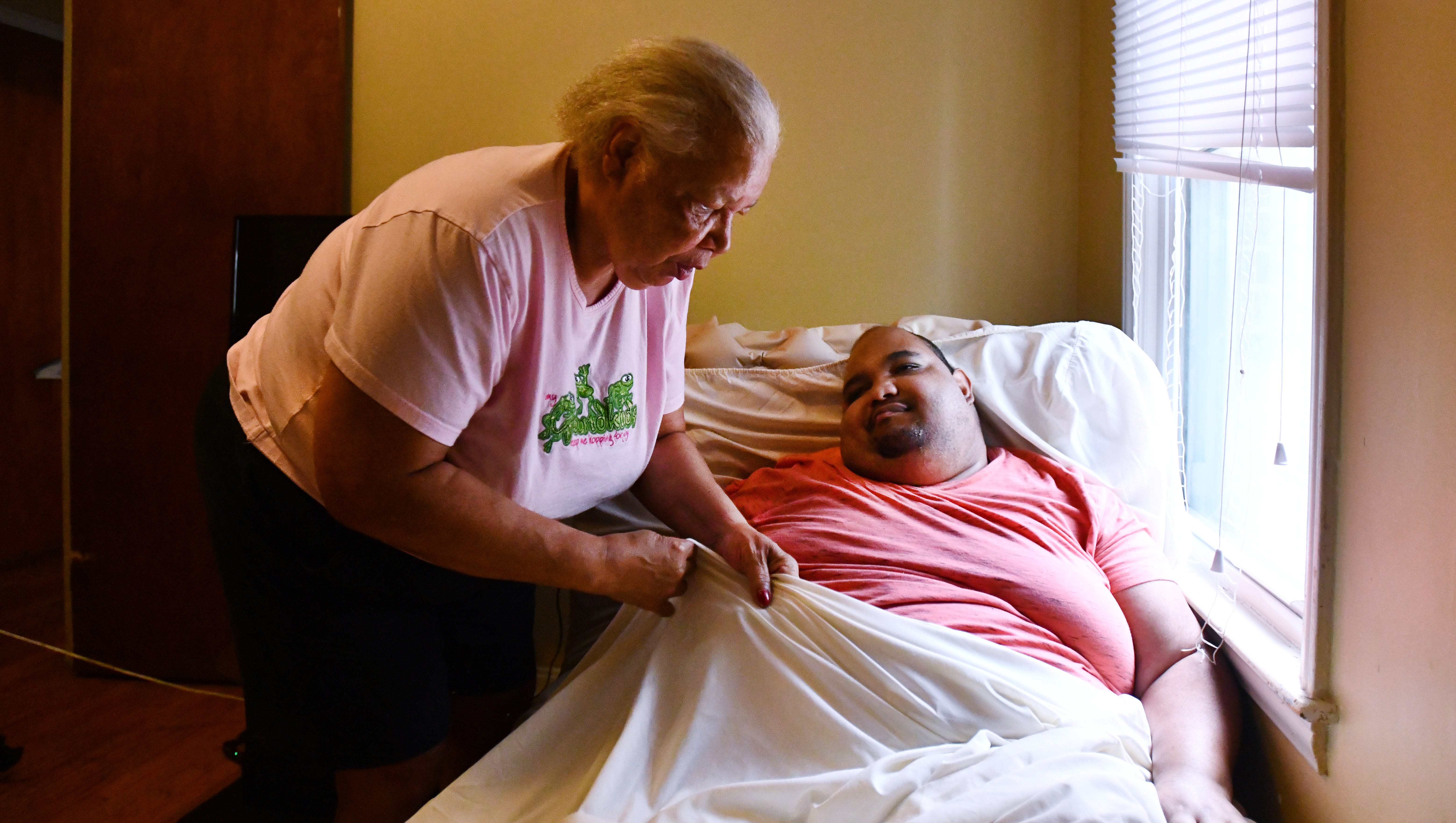Detroit bankruptcy 'threw everything into chaos' for retirees
 Christine Ferretti
Christine Ferretti
A retired widow, Debra Westbrook spends most of her time caring for her bedridden adult son.
But it's become more challenging, she said, after the city’s 2013 bankruptcy dealt a blow to her pension and health care that “threw everything into chaos.”
These days, the 64-year-old former Detroit water department worker said she’s struggling to cover more than $1,400 in monthly costs for her son's care, her mortgage, insurance and other bills.
"It’s eating me up alive," said Westbrook, who has seen her monthly pension drop from about $2,400 to $1,900 and is paying $788 a month for medical coverage. "Every month I'm robbing Peter to pay Paul."
Westbrook worked for the city of Detroit for 33 years before retiring in 2010 as the city struggled with its finances.
Her son, Marvin, 32, was born premature and has endured cerebral palsy, hydrocephalus and seizure and thyroid disorders. He's undergone numerous brain surgeries, added Westbrook, who has been a single parent since her husband was fatally shot in the city in 1989.
"God is good. He saw me through to work those 33 years," she said. "I thought I would be OK until the bankruptcy came."
Five years after the city's historic Chapter 9 filing, retirees such as Westbrook say the concessions reached through Detroit's bankruptcy continue to devastate. But those involved in the landmark case say while painful, those reductions were necessary to aid Detroit in becoming financially solvent.
Detroit filed for the largest municipal bankruptcy in U.S. history on July 18, 2013. It emerged nearly 17 months later with a plan to shed $7 billion in debt and sink another $1.7 billion into service upgrades over a decade.
Under the court-approved plan, about 32,000 active and retired city workers were affected by pension cuts and health care reductions.
General workers endured a 4.5 percent base cut in pensions and the elimination of an annual cost-of-living increase. The pensions of police and firefighters weren't cut but an annual 2.25 percent cost-of-living adjustment was reduced to about 1 percent.
The city also sought to recoup $239 million from the optional annuity savings fund accounts of some general retirees who were credited with interest earnings that exceeded the retirement system's actual investment returns.
The bankruptcy also helped Detroit slash its promised retiree health insurance benefits from $4.3 billion to $450 million.
Donald-Ray Smith worked 38 years for Detroit, starting as a bus driver in the 1980s. He went on to earn a bachelor's and master's degrees, ascending the ranks from a junior transit planner to a principal city planner.
When he retired in 2012, he was looking forward to a "great pension." But the base cut coupled with the annuity recoupment amounts to a loss of $714.39 per month for Smith.
He was among a number of retirees involved in a lawsuit against the city, arguing they deserved the pension that was promised before the bankruptcy filing.
A federal appeals court ultimately ruled 2-1 in the city's favor, saying the emergence from bankruptcy in 2014 was the result of a series of major settlements between the city and its creditors and must not be disturbed.
"I'm upset that what I worked for was taken away from me," said Smith, 68. "I've still got a very bad, sour taste in my mouth."
'Broken promises'
The reductions, while painful for some, could have been much worse, noted Gerald Rosen, the former chief U.S. District judge behind the so-called "grand bargain" settlement credited with helping speed Detroit through its bankruptcy.
"I'm not underestimating the pain, not just financial pain but the broken promise that was there. But there were decades of broken promises," Rosen told The Detroit News. "The nature of bankruptcies is contracts get impaired. It's a sad but true fact."
The grand bargain was a pillar of the debt-cutting plan crafted to shield the Detroit Institute of Arts collection from creditors and soften retiree pension cuts.

The deal pumps the equivalent of $816 million into the city's pension funds over 20 years through contributions made by private foundations, state taxpayers and private donors to the DIA.
The final cuts agreed upon in the bankruptcy were less severe than originally planned by then Detroit emergency manager Kevyn Orr, who targeted retirees for deep pension reductions in his debt-cutting proposal, said retired U.S. Bankruptcy Judge Steven Rhodes, who presided over the city's case. Reached by The News, Orr declined to comment for this story.
Rhodes said he's had conversations with pensioners since the bankruptcy who have detailed financial challenges tied to the cuts. Rhodes said he doesn't minimize the challenges retirees are facing, but noted that the pension classes, in the end, were treated far better than the other bankruptcy creditors.
"At the time of the bankruptcy, most people in the pension classes recognized that and were grateful for it," said Rhodes, adding retired and current workers voted overwhelmingly in favor of the reductions laid out in the plan. "They didn’t have to do that, but they did, and they were right to do that."
The city had promised lifetime health care benefits to its retirees. An obligation Rhodes said was not sustainable. At the time of Detroit's bankruptcy, pension and health care obligations made up about 40 percent of the city's annual budget, and it was projected to climb to 60-70 percent within a few years, he said.
The city got out from under its $4.3 billion retiree health care liability by creating independent health care trusts, known as Voluntary Employee Beneficiary Association, or VEBA. One trust is for general retirees, another is dedicated to police officers and firefighters who retired by Dec. 31, 2014.
"There had to be some sacrifice in order for the city to recover at all," Rhodes said. "I was satisfied then and remain satisfied now that it was the best the city could do in the circumstances."
The grand bargain relieved the city of much of its pension payments through 2023. In 2024, Detroit will have to start funding a substantial portion of the obligations from its general fund for the General Retirement System and Police and Fire Retirement System.
If earnings meet the bankruptcy plan's assumed return rate of 6.75 percent, the city will have to pay in about $167 million in 2024. But if there are no earnings, Detroit could be on the hook for $344 million or more.
To minimize a shortfall, the city's administration established a dedicated Retiree Protection Fund that's expected to pull together $335 million in the coming years to help meet the required contributions. More than $100 million already has been set aside.
It's a move that's earned Detroit high marks among rating agencies and that Rhodes says is "very encouraging."
Worried about economy
Mayor Mike Duggan said the city's biggest worry coming out of bankruptcy was the looming pension obligation, saying Detroit created the fund to ensure "our employees never again face pensions being cut."
"It wasn't an easy thing to do. We had a lot of needs for that $100 million," said Duggan, adding, however, that "protection pensions is the first priority."
John Serta, a trustee for the Detroit Police and Fire Retirement System, said the pension fund is appreciative of the city's effort to set aside the funding, but "what we're worried about is the economy."
"You never know what the future holds," said Serta, a Detroit police captain. "If the economy gets weak then I think it's going to be a struggle that can increase the obligations the city is going to have down the road."
Jeffrey Pegg, chairman of the police and fire pension system, said he wonders what will happen to the protection fund if Duggan leaves office prior to 2024.
“My concern is if he doesn’t run or he doesn’t win, what will happen then because that will be important,” he said.
Detroit City Council President Pro Tem Mary Sheffield said city leaders continue to look for ways to make the pensioners whole and haven't forgotten the sacrifices of retirees.
"I feel for them," she said. "It's on the minds of every single council member."
Despite that, retirees such as Catherine Phillips said "tens of thousands" of people impacted by the bankruptcy are "still suffering."
The city's restructuring resulted in a loss of about $300 from the $2,000-a-month pension Phillips, a former Detroit Water and Sewerage Department worker, primarily relies on to get by.
The 60-year-old is paying $1,120 per month for rent in Detroit's Lafayette Park. Her car payment is $480 per month and insurance is $220, she said.
"So how do you make it? By the grace of God," said Phillips, a former staff representative for AFSCME who retired in 2010 after 30 years in customer service for the water department.
"You do what you've got to do."
Read more:
After Detroit bankruptcy: Optimism, but 'challenges are real'
Howes: Five years on, Detroit shows real gains
Mike Duggan: Turning around Detroit
After bankruptcy, Detroit retirees feel deprived